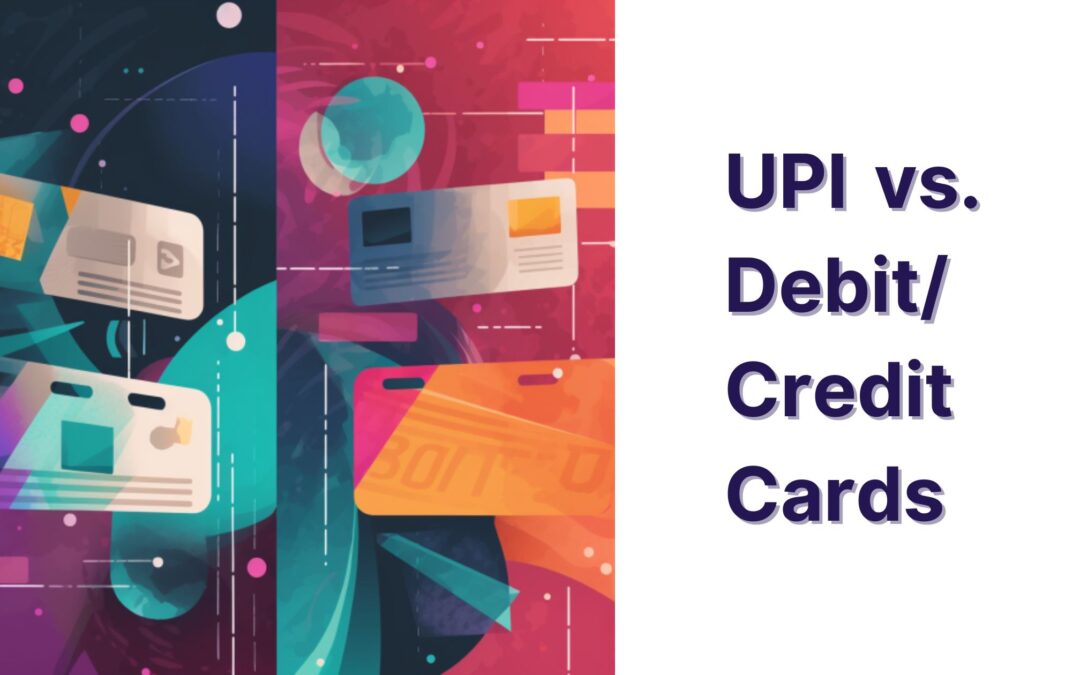As society moves in the direction of being cashless, digital payment methods have become increasingly important. When we talk about UPI vs. Debit/Credit Cards: Pros and Cons in India, we should keep in mind that both are the two most common forms of digital payment. Both types of payment have the benefit of being cashless, but each has its advantages and disadvantages. This article will provide a thorough analysis of the two payment options so that you may select the one that is most suitable for your needs. Let’s dive into the pros and cons of each to determine which reigns supreme in the battle for your financial transactions.
The Difference Between UPI vs. Debit/Credit Cards
Pros
- Seamless Transactions: UPI offers quick and hassle-free transactions. With just a few taps on your smartphone, you can send or receive money within seconds, eliminating the need for physical cards and lengthy card numbers.
- Interoperability: UPI is bank-agnostic, meaning you can link multiple bank accounts to a single UPI ID. This convenience allows you to manage funds from various banks under one digital roof.
- No Need for Physical Cards: Say goodbye to bulky wallets filled with cards. UPI operates purely in the digital realm, reducing the risk of losing physical cards and making transactions more secure.
There are a lot of differences between transferring money between UPI vs. Debit/Credit Cards. Let’s take a look at the cons now.
Cons
- Limited Acceptance: While UPI is gaining traction, it’s not universally accepted. Some merchants, especially in remote areas, may not offer UPI as a payment option.
- Internet Dependency: UPI transactions require an internet connection. In areas with poor connectivity, making payments can be a frustrating ordeal.
- Security Concerns: Though UPI offers robust security measures, cyber threats are ever-evolving. Users must stay vigilant and keep their devices secure to prevent unauthorized access.
The Trusty Debit/Credit Card
Pros
- Widespread Acceptance: Debit and credit cards are accepted virtually everywhere, making them a reliable choice for all kinds of transactions, from online shopping to international travel.
- Credit Advantages: Credit cards offer the flexibility of spending beyond your account balance, provided you repay on time. They also come with reward programs, cashback offers, and purchase protection.
- No Internet Required: Unlike UPI, debit/credit cards don’t rely on an internet connection for every transaction. This makes them a go-to option in areas with unstable connectivity.
Cons
- Risk of Overspending: Credit cards can be a double-edged sword. Their convenience can lead to overspending and accumulating debt if not managed responsibly.
- Card Frauds: Despite security features, card cloning and fraudulent transactions remain a concern. Stolen physical cards can be misused until reported, causing financial losses.
- Cumbersome for Online Transactions: Entering card details for online payments can be time-consuming and prone to errors. This can deter some users from using cards for e-commerce.
The Verdict of UPI vs. Debit/Credit Cards
In the battle of UPI vs. debit/credit cards, there’s no one-size-fits-all answer. The choice depends on your individual preferences and needs.
If you value speed, convenience, and digital minimalism, UPI is your go-to option. It’s ideal for quick peer-to-peer transfers and everyday transactions. However, ensure you have a reliable internet connection and are cautious about security.
On the other hand, if you prioritize universal acceptance, credit advantages, and a tangible backup for emergencies, debit/credit cards remain indispensable. They are a safe bet for both online and offline transactions.
Ultimately, the savvy consumer’s strategy is to have both UPI and debit/credit cards at their disposal. Use UPI for daily convenience and easy transfers while keeping debit/credit cards for broader financial needs. By embracing both options’ strengths, you can easily navigate the complex world of modern payments.
UPI vs. Debit/Credit Cards: Safety
Do not give out your personal identification number (PIN), and utilize the card blocking feature inside card controls to prevent unauthorized usage of your credit card. Do not give out your PIN to anyone; utilize the card blocking feature in card controls to prevent fraudulent use of your card.
Consider purchasing a fraud protection package for your debit card. If you want to avoid fraud, you should never give out your UPI PIN and you should always check the payment’s amount and the recipient’s information before confirming the transfer.
Conclusion
Choosing between UPI and debit/credit cards depends on your usage, needs, and preferences. If you frequently make small transactions and value convenience over security, UPI would be the ideal choice for you. On the other hand, if you make large transactions, prioritize security over convenience, and prefer a more widely accepted payment mode, then debit/credit cards are the way to go.
In the ever-evolving landscape of digital finance, UPI and debit/credit cards are two formidable contenders, each with its own set of advantages and disadvantages. Your choice should reflect your lifestyle, priorities, and financial goals. So, whether you tap, swipe, or scan, the power to decide lies in your hands.

